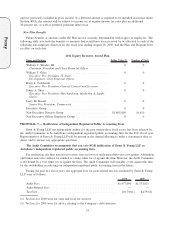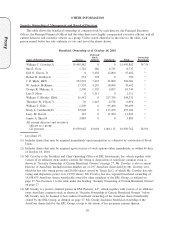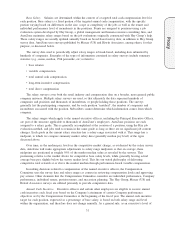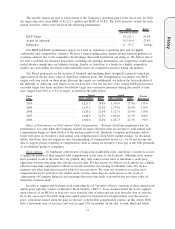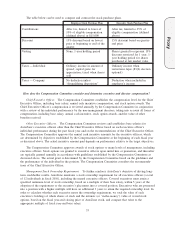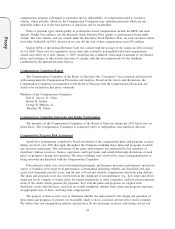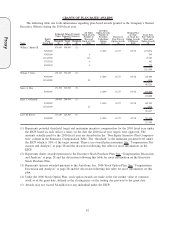AutoZone 2010 Annual Report Download - page 44
Download and view the complete annual report
Please find page 44 of the 2010 AutoZone annual report below. You can navigate through the pages in the report by either clicking on the pages listed below, or by using the keyword search tool below to find specific information within the annual report.
anniversaries of the grant date. They are granted at the fair market value on the date of grant as defined in the
relevant stock option plan. There is a $100,000 limit on the aggregate grant value of ISOs that may become
exercisable in any calendar year; consequently, the majority of options granted is in the form of non-qualified
stock options.
AutoZone grants stock options annually. Currently, the annual grants are reviewed and approved by the
Compensation Committee in the meeting (typically in late September or early October) at which it reviews
prior year results, determines incentive payouts, and takes other compensation actions affecting the named
executive officers. The Compensation Committee has not delegated its authority to grant stock options; all
grants are directly approved by the Compensation Committee. Option grant amounts for the Chief Executive
Officer’s direct reports and other senior executives are recommended to the Compensation Committee by the
Chief Executive Officer, based on individual performance and the size and scope of the position held.
AutoZone’s general policy is to limit the total option shares granted to its employees during the annual grant
process to approximately one percent of common shares estimated to be outstanding at the end of that fiscal
year. The annual grant is typically made near the beginning of the fiscal year and does not include promotional
or new hire grants that may be made during the fiscal year. The Committee reserves the right to deviate from
this policy as it deems appropriate.
Newly promoted or hired officers may receive a grant shortly after their hire or promotion. As a general
rule, new hire or promotional stock options are approved and effective on the date of a regularly scheduled
meeting of the Compensation Committee. On occasion, these interim grants may be approved by unanimous
written consent of the Compensation Committee. The grants are recommended to the Compensation Commit-
tee by the Chief Executive Officer based on individual circumstances (e.g., what may be required in order to
attract a new executive). Internal promotional grants are prorated based on the time elapsed since the officer
received a regular annual grant of stock options.
For more information about our stock option plans, see Discussion of Plan-Based Awards Table on
page 43.
Stock purchase plans. AutoZone maintains the Employee Stock Purchase Plan which enables all
employees to purchase AutoZone common stock at a discount, subject to IRS-determined limitations. Based
on IRS rules, we limit the annual purchases in the Employee Stock Purchase Plan to no more than $15,000,
and no more than 10% of eligible (base and incentive or commission) compensation. To support and encourage
stock ownership by our executives, AutoZone also established a non-qualified stock purchase plan. The Fourth
Amended and Restated AutoZone, Inc. Executive Stock Purchase Plan (“Executive Stock Purchase Plan”)
permits participants to acquire AutoZone common stock in excess of the purchase limits contained in
AutoZone’s Employee Stock Purchase Plan. Because the Executive Stock Purchase Plan is not required to
comply with the requirements of Section 423 of the Internal Revenue Code, it has a higher limit on the
percentage of a participant’s compensation that may be used to purchase shares (25%) and places no dollar
limit on the amount of a participant’s compensation that may be used to purchase shares under the plan.
The Executive Stock Purchase Plan operates in a similar manner to the tax-qualified Employee Stock
Purchase Plan, in that it allows executives to defer after-tax base or incentive compensation (after making
annual elections as required under Section 409A of the Internal Revenue Code) for use in making quarterly
purchases of AutoZone common stock. Options are granted under the Executive Stock Purchase Plan each
calendar quarter and consist of two parts: a restricted share option and an unvested share option. Shares are
purchased under the restricted share option at 100% of the closing price of AutoZone stock at the end of the
calendar quarter (i.e., not at a discount), and a number of shares are issued under the unvested share option at
no cost to the executive, so that the total number of shares acquired upon exercise of both options is equivalent
to the number of shares that could have been purchased with the deferred funds at a price equal to 85% of the
stock price at the end of the quarter. The unvested shares are subject to forfeiture if the executive does not
remain with the company for one year after the grant date. After one year, the shares vest, and the executive
owes taxes based on the share price on the vesting date (unless a so-called 83(b) election was made on the
date of grant).
34
Proxy


